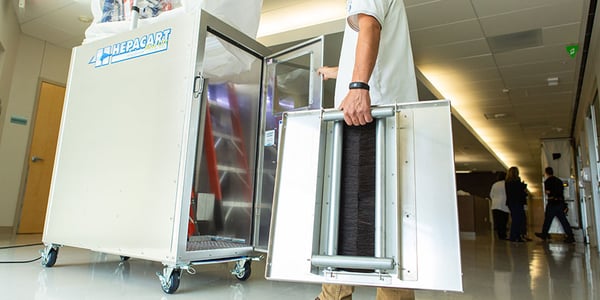Share this
How HEPACART® Helps Sustainability in Healthcare
by HEPACART on Jan 05, 2022
Buying from manufacturers that create sustainable healthcare products is essential.
The healthcare industry makes up approximately 18% of the U.S. economy. This means that — just like other large industry segments — it has a huge carbon footprint and contributes massively to municipal solid waste.
And it's not surprising that medical solid waste grew faster during the pandemic. The increase was largely due to the tidal wave of disposable PPE, medical packaging, and test products needed to safely treat patients infected with a highly contagious virus. Remarkably, the waste generated from PPE necessary to care for a single isolated patient produces over 3,700 pounds of solid waste in a year.
It's also not surprising that the recycling industry was unable to keep up with the volume, resulting in mismanaged plastic waste being discharged into the environment. According to researchers from Nanjing University in China and the Scripps Institution of Oceanography, UC San Diego:

Environmental Awareness
Think about the fact that waste emanating from the massive U.S. healthcare system is mostly incinerated. The same is mostly true for other developed countries. The problem is, incineration creates hazardous atmospheric carbon. The vast majority of scientists today (and increasingly nonscientists) understand that we need to reverse atmospheric carbon. It follows that the cooperation of every industry is necessary to clean up the environment by evolving toward more sustainable practices, healthcare included.
Whether your industry does more good for society than bad isn't really the issue here. Doctors, nurses, and hospital staff generate waste that must be removed from their facilities. So, how do we deal with this enormous task that seems not to be directly related to patient health but is actually crucial to the long-term health of everyone? Sustainability in healthcare is critical. Ideally, we would reduce waste to or below pre-pandemic levels, plan for far less waste in the future, and reduce healthcare's carbon footprint.
Sustainability Defined
Before we go further, we probably should provide the simplest possible definition of environmental sustainability. In fact, the concept is pretty easy to grasp: Environmental sustainability means responsible interaction with the environment to ensure that today's needs are met without jeopardizing the needs of future populations.
In other words, the healthcare industry — both as individual facilities and as a whole — has to work collectively and responsibly to provide care that’s effective but more sustainable, keeping the environment in mind.
What is Sustainability in Healthcare?
Some have the erroneous impression that nobody in healthcare cares about sustainability.
However, Healthcare Finance News reported in 2014 that more than half of hospitals were already making sustainability a factor in purchasing decisions. Further, they reported that healthcare professionals in more than 80% of hospitals expected to be invested in "sustainability purchasing" within two years.

One 2012 study found that sustainability efforts could save the healthcare industry $15 billion over ten years. This includes not only sustainable practices but sustainable building design for new facilities using modern technologies to achieve high energy efficiency, allowing for natural lighting and ventilation, and laying out rooms identically with beds and equipment in the same place to reduce errors and response times by staff.
Establishing Sustainability in Healthcare
Nearly a million staffed hospital beds produce about 5.9 million tons of solid waste every year. Even a small improvement will be a big deal. So what does the actual practice of sustainability look like in healthcare?

An action plan for environmental stewardship should begin with establishing an interdisciplinary team that includes nurses, staff from environmental services, managers, and infection control experts. They would gather data and study waste and disposal processes, and provide backing for initiatives such as:
- Zero-waste policies backed by training staff to reduce or eliminate waste and to reuse and recycle when possible
- Purchasing policies that prioritize the acquisition of reusables instead of disposables
- In areas where water is a scarce commodity, water conservation guidelines provided by the Healthcare Environmental Resource Center covering reuse of water and safe disposal of polluted water
- The use of telehealth services, which increased during the COVID-19 pandemic, should continue to be emphasized as a way to reach patients at home, thus reducing use of carbon-generating transportation
Our Contribution to Sustainability in Healthcare
So, where does HEPCART® come into play regarding sustainability in healthcare? The reason HEPACART is bringing you all of this information is because we hope to impart an understanding that buying from manufacturers that create products designed for sustainability is essential. The strength of our HEPACART product line is its durability, the opposite of disposability.
HEPACART's first ceiling access carts were sold to Shawnee Mission Medical Center (now AdventHealth) in 2006 and are still going strong. They (and other products such as AnteRoom and STARC® Systems customizable wall barriers) replace temporary enclosures, plastic, wood, and drywall, vastly reducing waste generated during construction and maintenance. Plus, HEPACART products are made of recyclable aluminum, giving them a long lifespan and a sustainable way to reuse or recycle.

We care about providing the healthcare industry with essential tools that eliminate non-recyclable waste while making jobs easier and facilities safer for patients, visitors, and staff.
Discover more about HEPACART’s values.
More reading:

